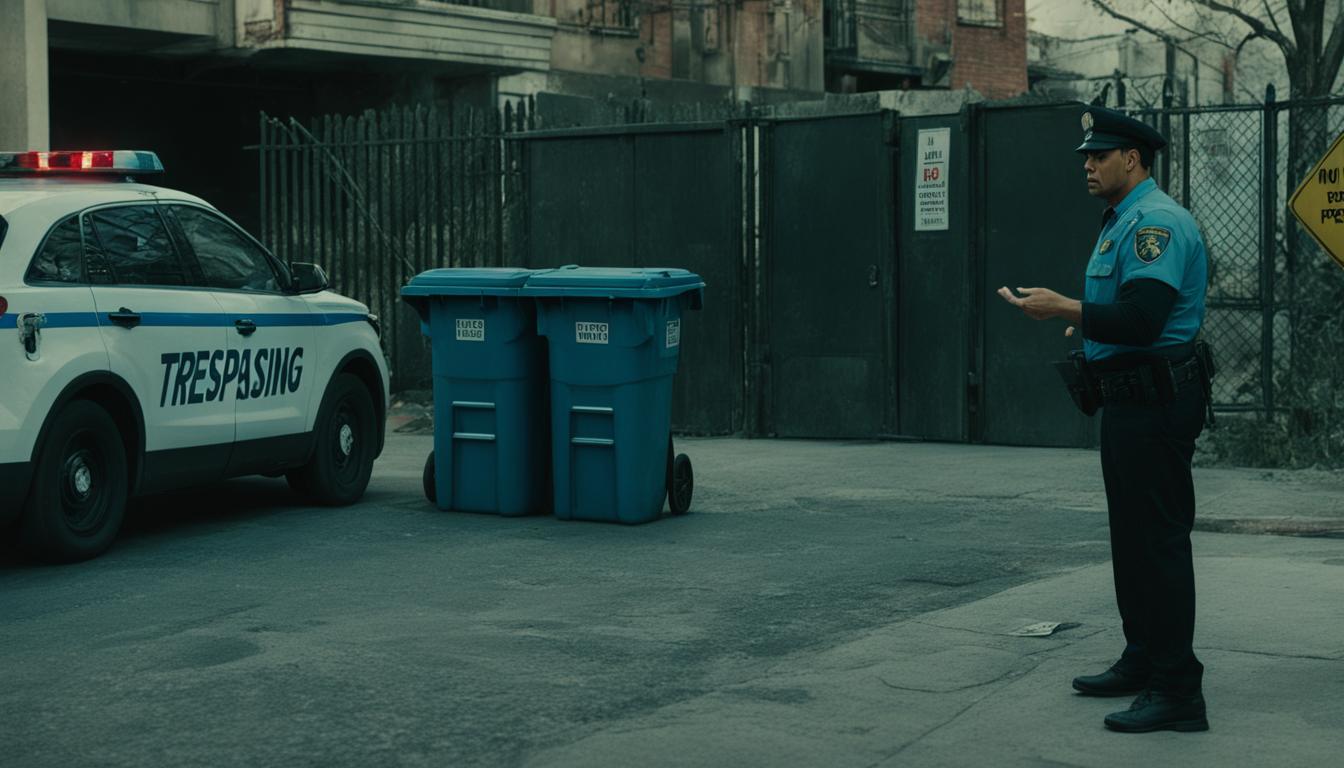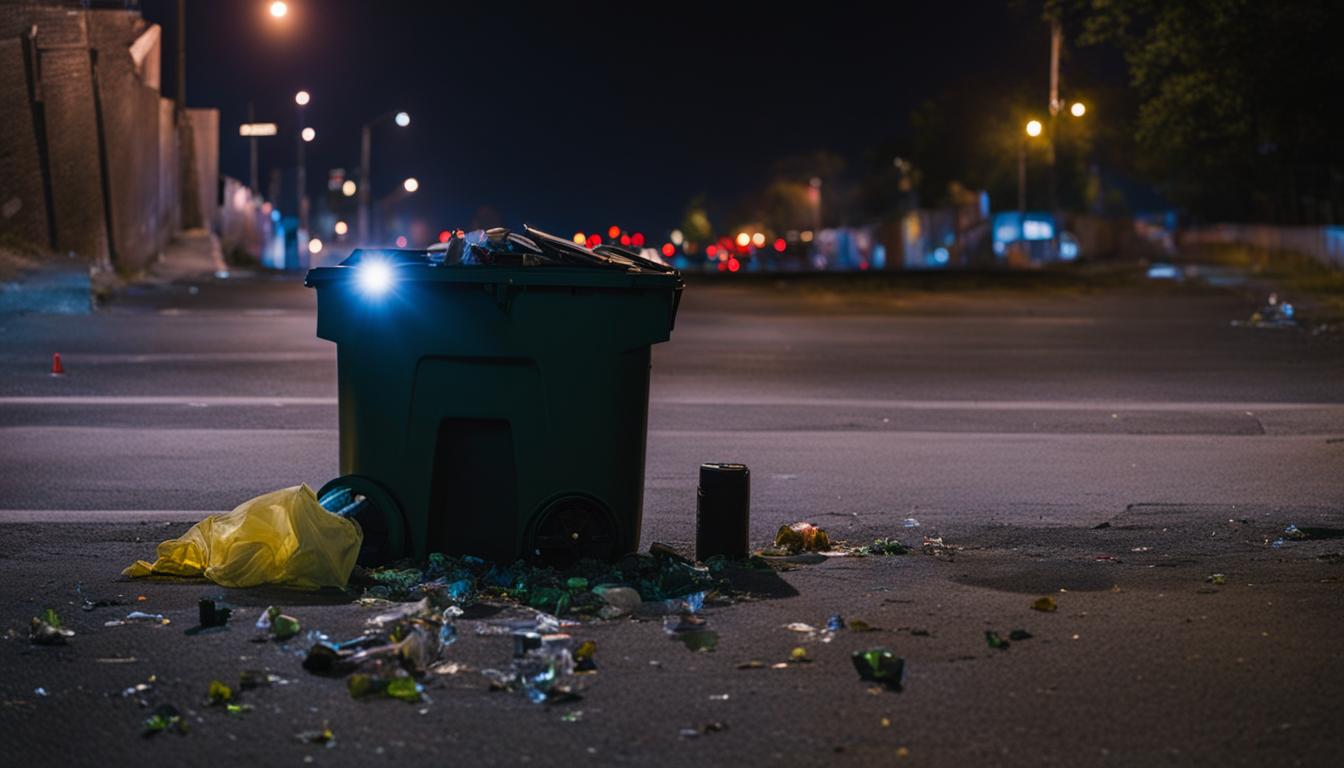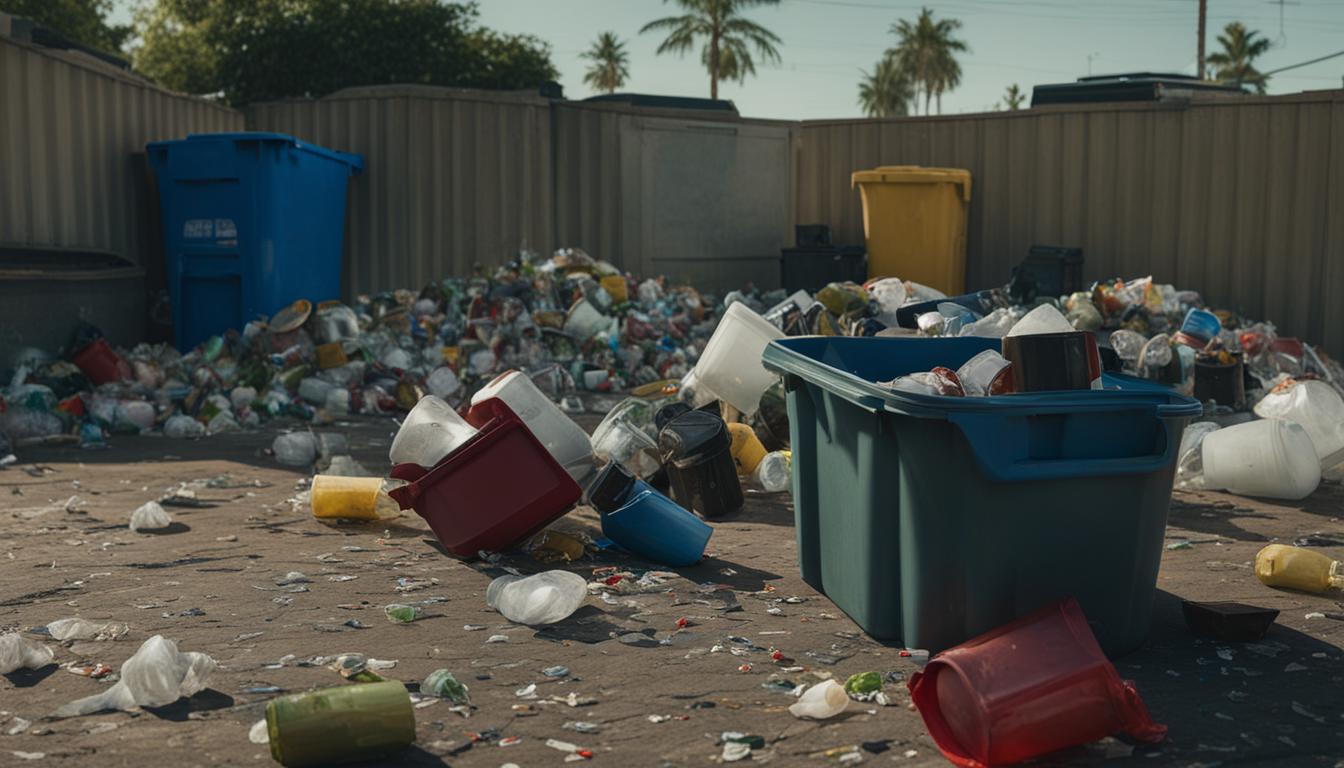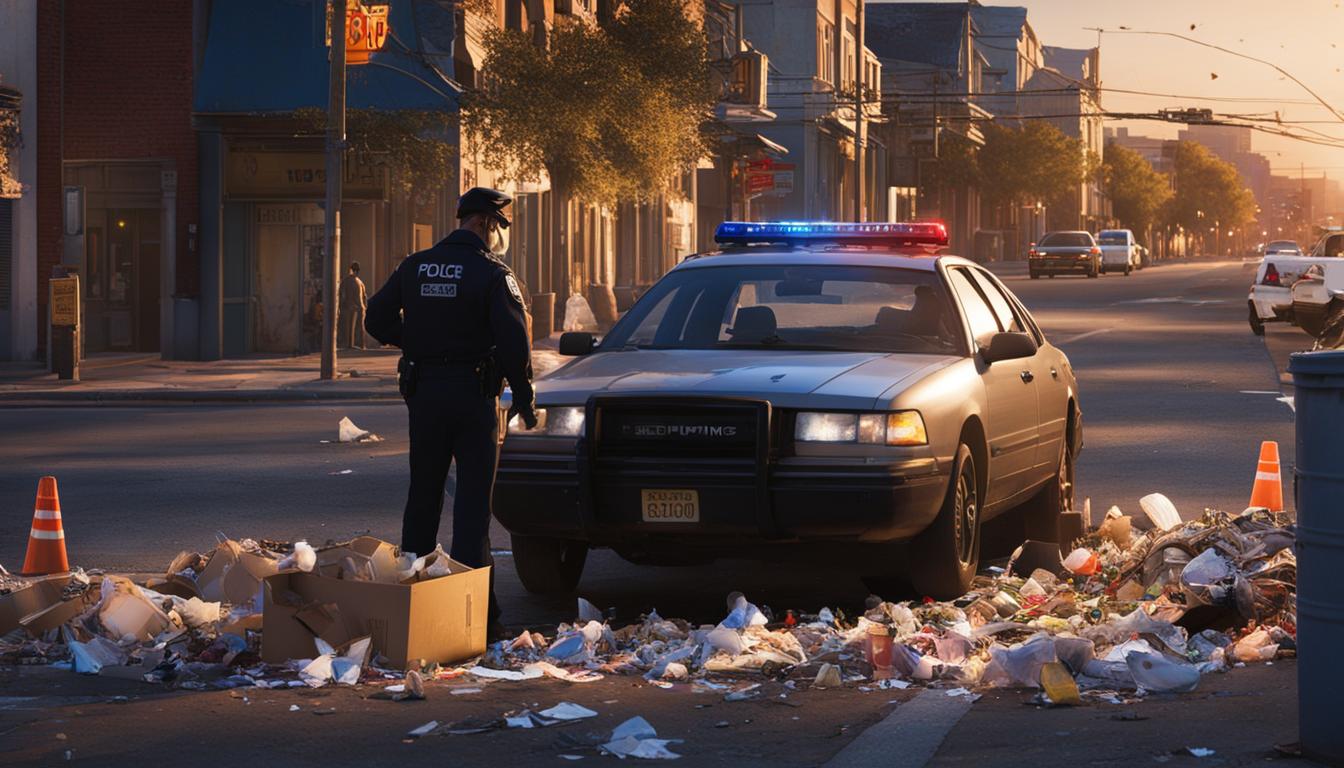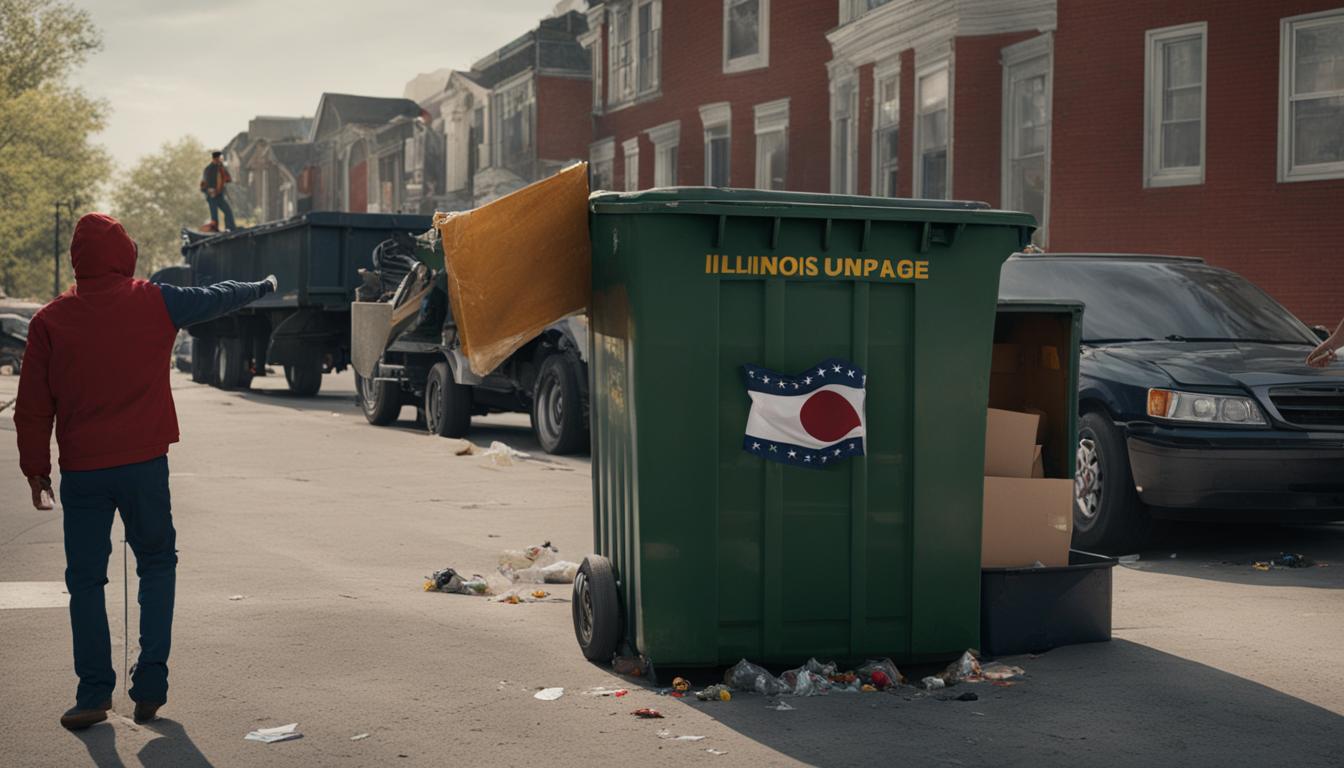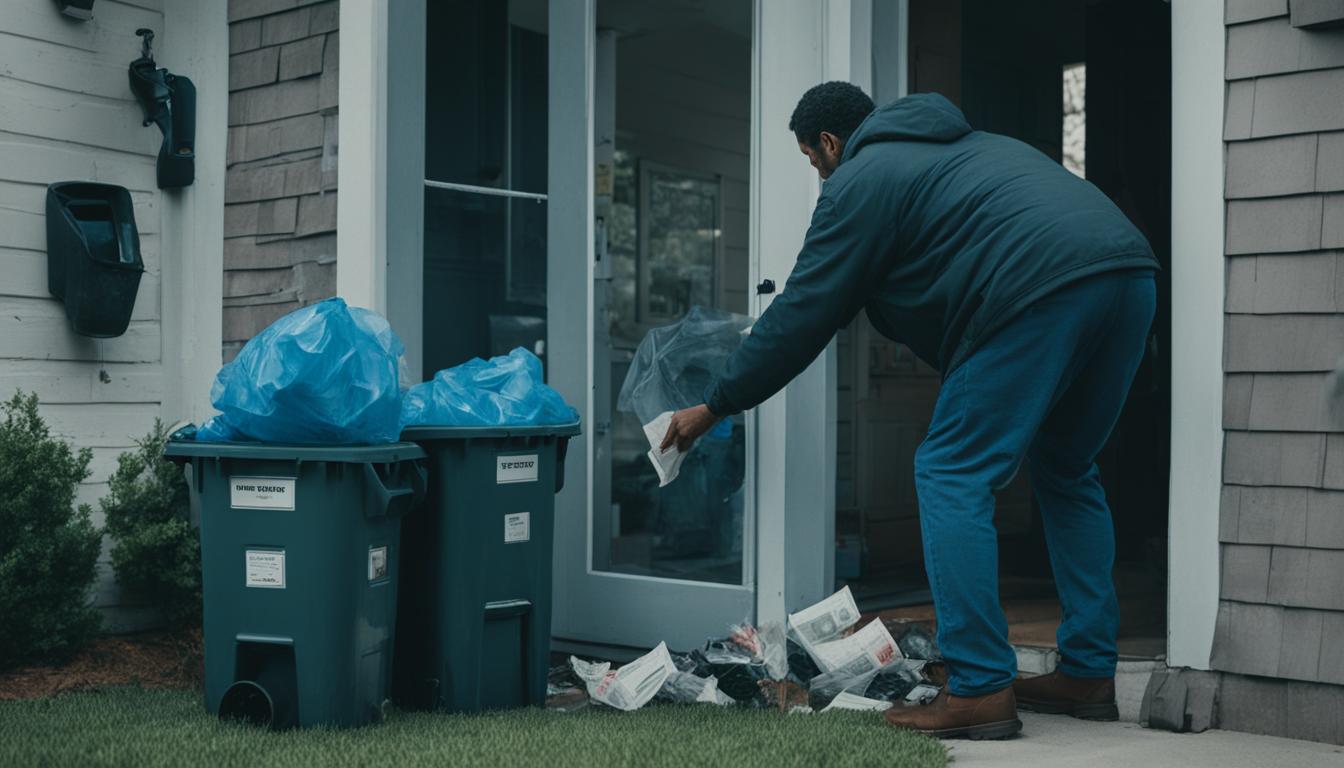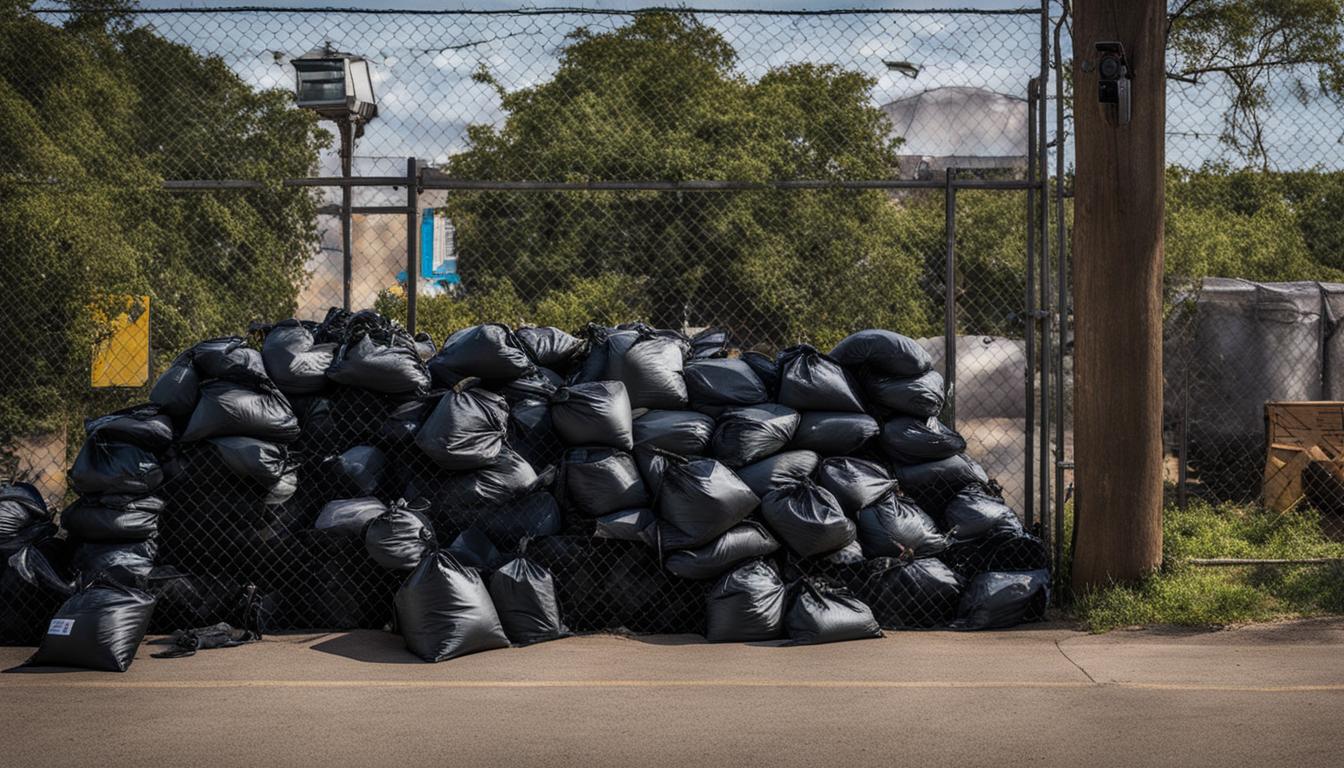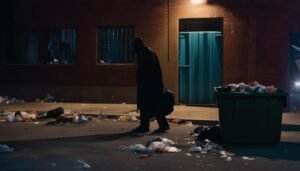Disclosure: This Post Contains Affiliate Links; We earn a commission on purchases.
In Ohio, the legality of going through someone’s trash is a complex issue. While dumpster diving and trash picking itself is not illegal, there are certain restrictions and considerations to keep in mind. The U.S. Supreme Court decision in California vs Greenwood established that trash left outside a home or property is considered public domain and does not have a reasonable expectation of privacy. However, local ordinances and state statutes may vary, so it’s important to understand the specific laws in Ohio regarding trash privacy.
Key Takeaways:
- Ohio trash privacy laws allow for the collection of items left outside a home or property.
- The U.S. Supreme Court decision in California vs Greenwood established that trash in public domain does not have a reasonable expectation of privacy.
- Local ordinances and state statutes may impose additional restrictions on going through trash in Ohio.
- Understanding Ohio’s specific laws regarding trash privacy is important to avoid any legal issues.
- While dumpster diving itself may be legal, it’s crucial to respect property rights and comply with trespassing laws.
The Legality of Dumpster Diving in Ohio
Dumpster diving is a common practice for individuals seeking discarded items or salvageable goods. In Ohio, dumpster diving is generally legal, but it is important to adhere to specific guidelines to stay within the boundaries of the law.
When engaging in dumpster diving in Ohio, it is crucial to avoid trespassing on private or residential properties. Respecting any “No Trespassing” signs is essential to prevent any legal consequences or disputes. Dumpster divers should also refrain from tampering with locked dumpsters or vandalizing property, as these actions are strictly prohibited and can result in legal penalties.
While dumpster diving itself may be legal, it is crucial to comply with Ohio’s laws pertaining to trespassing and property rights. By respecting these guidelines, dumpster divers can navigate the practice legally and responsibly.
Remember, dumpster diving can be a legitimate way to find discarded items, but it’s important to do so in a lawful manner, respecting private property rights and following Ohio’s laws and regulations.
In summary, the legality of dumpster diving in Ohio hinges on adhering to trespassing laws and property rights. By respecting these guidelines and exercising caution, individuals can engage in dumpster diving legally and responsibly.
Next, let’s explore the risks and considerations associated with dumpster diving in Ohio.
Risks and Considerations of Dumpster Diving
Although dumpster diving may be legal, it is not without its risks and considerations. Individuals who engage in dumpster diving should be aware of potential health hazards, such as bacterial or viral infections, as discarded items may harbor harmful pathogens. Additionally, there is a risk of encountering dangerous substances or materials inside dumpsters, including broken glass or sharp objects. Falling into a dumpster, getting trapped, or sustaining cuts and wounds are also hazards to be mindful of. It is important to prioritize personal safety and take precautions while engaging in dumpster diving activities.
Health Risks
Dumpster diving exposes individuals to various health risks due to the nature of the discarded items. As dumpsters often contain decomposing waste, there is an increased likelihood of bacterial contamination. Pathogens such as E. coli, Salmonella, or Staphylococcus can thrive in these environments and cause severe illnesses, including gastrointestinal infections. Additionally, dumpsters located near medical facilities or pharmaceutical establishments may contain hazardous medical waste, leading to potential exposure to sharps or infectious materials.
Dangerous Substances and Materials
Dumpsters can contain a mix of regular trash and hazardous materials, making them potentially unsafe environments. These materials may include broken glass, rusty metal, or sharp objects that can cause cuts, puncture wounds, or tetanus infections. Chemicals, liquids, or flammable substances may also be present, posing the risk of chemical burns, fires, or explosions. It is important to exercise caution and avoid handling unknown or potentially dangerous items while dumpster diving.
Physical Hazards
Engaging in dumpster diving activities can lead to physical injuries if proper precautions are not taken. Falling into a dumpster or climbing on unstable objects to access dumpsters can result in sprains, fractures, or head injuries. Getting trapped inside a dumpster is a serious concern, especially if the lid closes unexpectedly or if the dumpster is emptied by a waste collection truck. It is crucial to have a plan in place and be aware of escape routes to mitigate the risk of accidents.
| Risks | Considerations |
|---|---|
| Bacterial or viral infections | Discarded items may harbor harmful pathogens |
| Dangerous substances and materials | Broken glass, sharp objects, or hazardous chemicals may be present |
| Physical hazards | Falling into dumpsters, getting trapped, or sustaining cuts and wounds |
It is crucial to prioritize personal safety while engaging in dumpster diving activities. Consider the following safety tips:
- Wear protective gloves, sturdy shoes, and long-sleeved clothing to minimize the risk of cuts, punctures, and skin exposure to potentially harmful substances.
- Use a flashlight or headlamp to improve visibility inside dark dumpsters and avoid accidental injuries.
- Avoid climbing on unstable surfaces or reaching too far into dumpsters to prevent falls or entrapment.
- Dispose of any discarded items in a safe manner, keeping in mind the potential for hazardous materials.
- Regularly wash hands thoroughly with soap and water after each dumpster diving session to reduce the risk of infection.
It is important to prioritize personal safety and take precautions while engaging in dumpster diving activities.
Ohio’s Litter Laws and Trash Disposal Regulations
Ohio has implemented strict laws and regulations to combat littering and illegal dumping. According to the Ohio Revised Code, it is illegal to deposit litter on public or private property without proper authorization or in a manner that could cause its dispersion by natural elements.
Litter encompasses a wide range of waste materials and unsightly debris. It is crucial to understand that litter receptacles are specifically designated for the disposal of waste generated during routine activities. Violations of Ohio’s litter laws can lead to legal penalties and fines.
“Improper disposal of litter not only tarnishes the environment but also poses serious risks to public health and safety. We encourage all Ohio residents to adhere to the litter laws and support efforts to maintain clean and pristine communities.”
| Type of Offense | Fine | Possible Community Service |
|---|---|---|
| First Offense | $100 – $500 | Up to 240 hours |
| Repeat Offense | $500 – $1,000 | Up to 480 hours |
| Third Offense | $1,000 – $2,500 | Up to 720 hours |
Illegal dumping not only contravenes the law but also harms the environment, wildlife, and communities. By responsibly disposing of waste and reporting instances of littering or illegal dumping, individuals can actively contribute to maintaining the cleanliness and well-being of Ohio’s natural resources.
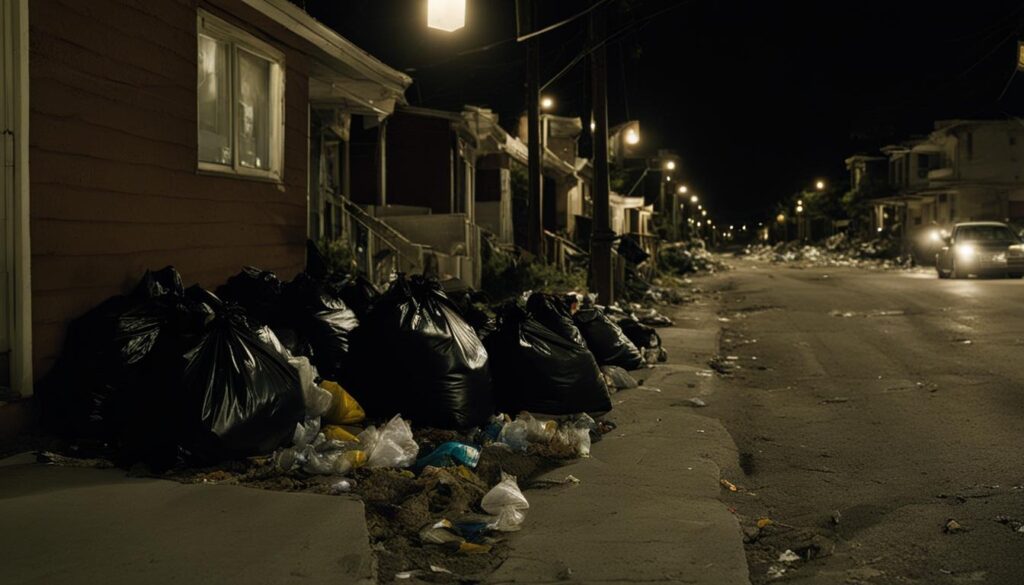
Protecting Your Privacy and Personal Information
While the legality of going through trash in Ohio may vary, it is important to consider the potential privacy implications. Discarded items in trash can reveal personal information and details about an individual’s daily activities. This information can be utilized by various parties, including law enforcement, private investigators, or even identity thieves.
To protect personal privacy, individuals should take the following precautions:
- Shredding sensitive documents: Whenever possible, shred documents containing personal information such as bank statements, credit card bills, medical records, and other sensitive data before disposing of them.
- Disposing of personal items properly: Ensure that personal items, such as old IDs, passports, or expired credit cards, are disposed of properly and not left in accessible trash bins.
- Mindful discarding: Be conscious of the information being discarded and avoid throwing away any documents or items that could potentially compromise personal privacy.
By following these practices, individuals can safeguard their privacy rights and minimize the risk of personal information falling into the wrong hands.
“Your trash can be a treasure trove of personal information. Take steps to protect yourself by shredding sensitive documents and being mindful of what you discard.”
It is crucial to stay informed about privacy rights in Ohio and understand the potential risks associated with the improper disposal of personal information. By taking proactive measures to protect privacy, individuals can mitigate the chances of unauthorized access to their personal data.
Understanding Ohio’s Recycling Regulations
Ohio has established specific regulations to promote recycling and responsible waste disposal. By adhering to these recycling laws, individuals can contribute to environmental sustainability and avoid potential legal issues related to recycling. It is important for Ohio residents to familiarize themselves with the state’s recycling requirements and follow proper procedures for recycling materials.
Ohio’s recycling regulations prohibit going through recycling bins or items left out for collection, as these materials are designated for recycling purposes and should not be tampered with. However, Ohio encourages individuals to engage in responsible recycling practices by utilizing designated recycling centers and following local recycling guidelines.
Benefits of Recycling- Reduces the amount of waste sent to landfills
- Conserves natural resources
- Prevents pollution caused by the extraction and production of new materials
- Helps conserve energy
- Creates job opportunities in the recycling industry
- Reduces the amount of waste sent to landfills
- Conserves natural resources
- Prevents pollution caused by the extraction and production of new materials
- Helps conserve energy
- Creates job opportunities in the recycling industry
By recycling, Ohio residents can make a positive impact on the environment and contribute to a more sustainable future.
Recyclable Materials in Ohio
Ohio’s recycling regulations cover a wide range of materials that can be recycled. These include, but are not limited to:
- Paper and cardboard
- Glass bottles and jars
- Plastic containers and bottles
- Metal cans
- Electronics
- Batteries
It is important to check specific local guidelines to understand which materials are accepted for recycling in your area.
Proper Recycling Procedures
To ensure effective recycling, it is crucial to follow proper procedures. Here are some guidelines to keep in mind:
- Separate recyclable materials from non-recyclable waste.
- Remove any contaminants from recyclable materials, such as food residue or labels.
- Check for specific guidelines on preparing materials for recycling, such as crushing plastic bottles or removing caps.
- Take materials to designated recycling centers or participate in curbside recycling programs.
By following these procedures, individuals can help streamline the recycling process and ensure that materials are properly recycled.
| Material | Recycling Guidelines |
|---|---|
| Paper and Cardboard | Separate from other waste, remove any packaging materials, and ensure materials are dry and clean. |
| Glass Bottles and Jars | Remove any lids or caps, rinse the containers, and separate by color. |
| Plastic Containers and Bottles | Check for recycling codes to identify acceptable materials, empty and rinse containers, remove caps, and flatten if applicable. |
| Metal Cans | Rinse cans to remove any food residue, flatten if possible, and separate aluminum cans from steel cans. |
| Electronics | Find designated recycling centers or take advantage of electronics recycling events. |
| Batteries | Research local battery recycling options, as certain batteries require specialized recycling processes. |

By understanding and abiding by Ohio’s recycling regulations, individuals can contribute to a cleaner environment and help create a more sustainable future for generations to come.
Common Misconceptions and Frequently Asked Questions
Addressing common misconceptions and clarifying frequently asked questions about trash privacy in Ohio is essential to ensure a clear understanding of the legal landscape. Misinformation often leads individuals to assume that their discarded trash enjoys legal protection once placed outside their property. However, as established by the U.S. Supreme Court decision in California vs Greenwood, discarded trash generally does not have a reasonable expectation of privacy.
It is crucial for individuals to familiarize themselves with the specific laws and regulations in their jurisdiction to avoid misunderstandings about the legality of going through trash. By understanding the rights and limitations surrounding trash privacy in Ohio, individuals can protect themselves and make informed decisions.
Common Misconception: Trash is always private once discarded
“It is a common misconception that once trash is placed outside a home or property, it automatically enjoys protection from legal scrutiny. However, the U.S. Supreme Court decision in California vs Greenwood established that individuals generally do not have a reasonable expectation of privacy once their trash is discarded.”
Common Misconception: Going through trash is illegal in all circumstances
“Another common misconception is that going through trash is universally illegal. While dumpster diving can be subject to certain restrictions, such as trespassing laws and property rights, it is not inherently illegal. It is important to understand and comply with applicable laws and regulations to avoid legal issues.”
Frequently Asked Question: Are there any restrictions on going through trash in Ohio?
Yes, there are restrictions on going through trash in Ohio. While dumpster diving itself is generally legal, individuals must adhere to trespassing laws, respect property rights, and comply with any local ordinances or state statutes that may apply. It is crucial to avoid trespassing on private or residential properties and to respect any “No Trespassing” signs. Tampering with locked dumpsters or vandalizing property is strictly prohibited and may result in legal penalties.
Frequently Asked Question: Can I be prosecuted for going through someone else’s trash?
In general, going through someone else’s trash without their permission is not a prosecutable offense, as discarded trash is considered public domain under the U.S. Supreme Court decision. However, it is important to comply with all applicable laws and regulations, as well as respect property rights and privacy concerns. It is recommended to understand and follow the specific laws in your jurisdiction to avoid any potential legal issues.
Frequently Asked Question: Can law enforcement search my trash without a warrant?
Under the U.S. Supreme Court decision mentioned earlier, law enforcement generally does not require a warrant to search through discarded trash. However, it is essential to consult and understand the specific laws regarding trash privacy in your jurisdiction, as there may be exceptions or additional regulations that provide greater protection. Consulting legal professionals can provide further insights into the specific circumstances and requirements.
Frequently Asked Question: How can I protect my privacy when it comes to trash?
To protect your privacy when it comes to trash, it is important to take certain precautions. Shredding sensitive documents before disposing of them is one effective way to safeguard personal information. Additionally, being mindful of the information you discard and disposing of personal items properly can help reduce the risk of privacy breaches. Familiarizing yourself with the specific laws and regulations in your jurisdiction and understanding your rights and limitations is key to protecting your privacy.
Conclusion
In conclusion, dumpster diving in Ohio is a practice that requires careful consideration of the legal landscape and potential risks involved. While it may generally be legal to go through trash in Ohio, individuals must ensure that they adhere to trespassing laws and respect property rights. Prioritizing personal safety and being aware of potential health hazards are essential when engaging in dumpster diving activities.
Moreover, protecting personal privacy and safeguarding sensitive information should be a top priority. Discarded items can reveal personal information and expose individuals to various risks, including identity theft. Taking measures such as shredding sensitive documents and being cautious about the information discarded can help mitigate these risks.
Understanding Ohio’s litter laws, recycling regulations, and other relevant statutes is also crucial for individuals to navigate the legal landscape surrounding trash privacy. By being knowledgeable about local regulations and following the proper procedures for recycling and waste disposal, individuals can contribute to environmental sustainability and avoid legal complications.
In summary, while dumpster diving in Ohio may be legally permissible, individuals must approach it with caution and a thorough understanding of the relevant laws and regulations. By balancing legality, safety, and privacy concerns, individuals can engage in dumpster diving responsibly and make the most of discarded items while minimizing potential risks.
Source Links
- https://residentnews.net/2020/04/02/is-it-legal-for-someone-to-go-through-your-trash/
- https://www.gregoryrolloffcontainers.com/is-dumpster-diving-illegal-in-ohio/
- https://codes.ohio.gov/ohio-revised-code/section-3767.32

Subscribe to Our Newsletter

